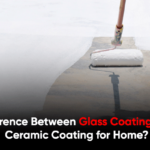What is the Heat Resistant Coating for Glass?
In an era of rising global temperatures and soaring energy bills, maintaining comfortable indoor environments has become a top priority. One innovation leading the charge is Anti Heat Coating For Glass. At Heatcure, we specialize in premium heat resistant coatings that transform regular glass into energy-efficient, heat-repelling surfaces.
This blog explores everything you need to know about heat resistant coatings for glass, how they work, their benefits, and why Heatcure is the trusted choice.
Understanding Heat Resistance in Glass
Glass is widely used in modern architecture due to its aesthetic appeal and ability to allow natural light. However, untreated glass also permits significant heat transfer, leading to uncomfortable indoor temperatures and increased energy consumption.
To address this, Anti Heat Coating For Glass Surfaces has emerged as a highly effective solution. These coatings reduce the amount of heat that enters through glass without compromising visibility or design.
What is Anti Heat Coating For Glass Surfaces?
Anti heat coating is a specialized transparent layer applied to glass surfaces to reflect solar heat and block UV rays. It is engineered to reduce solar heat gain by filtering infrared (IR) and ultraviolet (UV) radiation while maintaining optimal light transmission.
At Heatcure, our Anti Heat Coating For Glass Surfaces uses advanced nanotechnology to offer long-lasting, invisible protection against heat and harmful radiation, making your interiors cooler, more energy-efficient, and UV-safe.
How Does Heatcure’s Coating Work?
Heatcure’s coating is a nano-ceramic formulation that bonds seamlessly with glass. It reflects a significant portion of infrared radiation and blocks up to 99% of UV rays. Unlike traditional tinted films, our anti heat coating remains clear, ensuring that natural daylight continues to illuminate your space.
This smart solution minimizes indoor temperature rise without compromising on visibility or aesthetic appeal, making it ideal for both residential and commercial buildings.
Benefits of Anti Heat Coating For Glass Surfaces
-
Energy Efficiency: By reducing solar heat gain, it decreases the load on air conditioning systems and lowers electricity costs.
-
UV Protection: Prevents sun damage to furniture, flooring, and interiors by blocking harmful ultraviolet rays.
-
Comfort Improvement: Maintains a cooler, more comfortable environment throughout the year.
-
Clear Appearance: Transparent coating that doesn’t alter the appearance of your glass windows or façades.
-
Eco-Friendly: Reduces your carbon footprint and supports sustainable building practices.
With Heatcure, you get a solution that combines performance, transparency, and durability.
Applications of Heatcure’s Anti Heat Coating
The versatility of Heat Block Coating for Glass makes it suitable for a wide range of applications:
-
Residential windows and balconies
-
Commercial and office buildings
-
Showrooms and retail outlets
-
Hospitals, hotels, and schools
-
Glass roofs, partitions, and skylights
-
Automotive windows and sunroofs
Wherever there’s glass, Heatcure enhances its performance and thermal control.
Why Choose Heatcure?
At Heatcure, we deliver more than just a product—we deliver peace of mind. Our anti heat coating solutions are backed by:
-
Certified, lab-tested technology
-
Professional application by trained experts
-
Competitive pricing and strong return on investment
-
Custom solutions tailored to your architectural needs
Thousands of satisfied clients across residential, commercial, and industrial sectors trust Heatcure for reliable heat control and UV protection.
Conclusion
If you’re seeking an effective and long-term solution to combat indoor heat without compromising on aesthetics or natural light, Anti Heat Coating For Glass Surfaces by Heatcure is the ideal choice. It enhances energy efficiency, improves comfort, and protects your interiors—making your space smarter and more sustainable.
FAQS
Q1: What type of coating is most resistant to high heat?
Nano-ceramic coatings are among the most resistant to high heat. Heatcure uses a nano-ceramic anti heat coating that withstands extreme temperatures while maintaining optical clarity.
Q2: What material is heat resistant glass?
Heat resistant glass is typically made from borosilicate glass or tempered glass, often enhanced with a heat reflective coating like Heatcure’s Anti Heat Coating For Glass Surfaces.
Q3: What glass coating reflects heat?
A solar reflective coating or anti heat coating like the one offered by Heatcure is specifically designed to reflect heat and reduce solar gain through glass surfaces.
Q4: How can we reduce heat loss in glass?
To reduce heat loss in glass, apply a low-emissivity (Low-E) or anti heat coating. Heatcure’s Anti Heat Coating For Glass Surfaces helps retain indoor temperature by minimizing both heat gain and heat loss.
Q5: What substance is added to glass to make it heat-resistant?
Substances like silica, boron oxide, and alumina are added during manufacturing to create heat-resistant glass. For surface-level protection, applying Heatcure’s anti heat coating is highly effective.
Q6: What coating reduces temperature?
Anti heat coatings reduce indoor temperature by reflecting solar radiation. Heatcure’s Anti Heat Coating For Glass Surfaces significantly lowers interior heat levels without blocking natural light.


Comment (0)